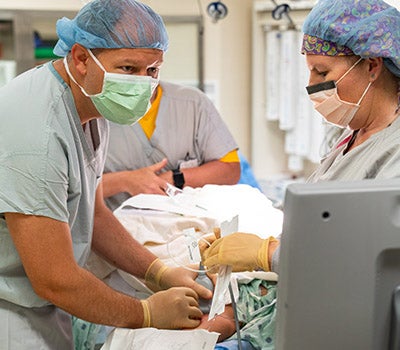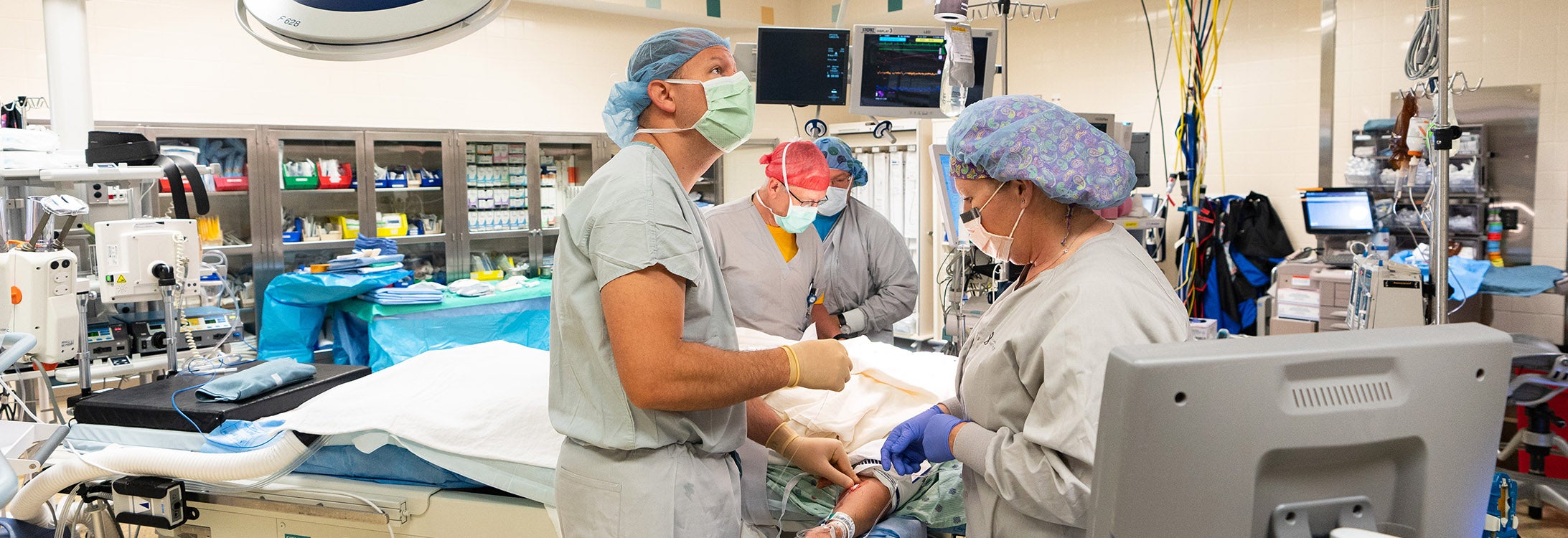LOWER RISK, LESS INVASIVE
New procedure at ECU, Vidant offers safer option for patients with stroke risks
East Carolina University physicians at Vidant Medical Center are providing patients at risk of having a stroke the opportunity to significantly reduce their future stroke risk through a new procedure that is less invasive – and boasts a lower risk of long-term complications – than traditional techniques.
In July, surgeons from the East Carolina Heart Institute at ECU performed the first transcarotid arterial revascularization (TCAR) procedures at Vidant Medical Center.

Dr. Bryan Ehlert.
This novel approach to traditional carotid stenting allows surgeons to access and repair the affected carotid arteries through a small incision above the collarbone, instead of having to perform an open repair or the more traditional repair in which the stent is placed in through the groin. This technique allows the surgeons to safely place the stent in the patient’s artery without dislodging anything that can go on to cause a stroke. The patient’s blood is also filtered to prevent the plaque from further embolizing.
“This brings a new technology to the patients of eastern North Carolina which provides a reduced stroke risk, is more minimally invasive, has a lower risk of nerve injury and a lower risk of long-term complications,” said Dr. Bryan Ehlert, assistant professor in the Division of Vascular Surgery at ECU’s Brody School of Medicine.
Large-scale studies have shown that the stroke risk was as high as 6 percent for patients who underwent the traditional stenting procedure and as high as 4 percent for patients who received open repairs, Ehlert said.
“With this procedure, that risk has been seen to have been reduced to approximately 1 percent in all patients,” he said.
Patients who qualify for the TCAR procedure are those who have either had a prior stroke or neurologic event from a carotid plaque or those who have a critical stenosis – which is the narrowing of an artery – that increases their stroke risk over the next two to three years. Patients in eastern North Carolina who fit into one of these categories previously had to travel to the Research Triangle or to Virginia to receive the safer, more effective TCAR repair, Ehlert said.
“This now provides patients the opportunity to have their procedure done here locally,” said Ehlert, adding that makes the entire process easier for patients and their families. “It also provides us a way to treat those patients who were previously found to be unfit for general anesthesia and a traditional open revascularization.”

Albertson resident Brian Griffin was one of the first patients in eastern North Carolina to undergo the TCAR procedure to repair a clogged carotid artery.
Earlier this year, Albertson resident Brian Griffin thought he had a cold only to find out from his doctor that he had two blocked arteries and was at risk of having a stroke.
The 55-year-old grandfather of six underwent the traditional stenting procedure in March to repair the artery on the left side of his neck. After dealing with a couple post-operative issues from that procedure, Griffin opted to try the new TCAR procedure to repair the artery on the other side of his neck.
Dr. Dean Yamaguchi, assistant professor in Brody’s Division of Vascular Surgery, performed the TCAR procedure on Griffin in August, which Griffin said was a much easier experience than his previous procedure.
“The first surgery was a little difficult to deal with,” Griffin said. “But with the second, I’ve had no problems at all. I recommend it for anybody.”
Griffin, who has family members who underwent carotid stenting, said he is happy that the TCAR procedure was an easily accessible option for him.
“My prognosis is good and I feel better,” he said. “They’ve come a long way in Greenville and they’re trying new stuff. It’s amazing what they can do.”
ECU surgeons have already performed nearly 20 TCAR procedures since July. According to Silk Road Medical, the California-based company that develops the devices used in the TCAR procedure, this makes ECU and Vidant’s TCAR program one of the fastest growing in the nation.
“This shows the commitment of this institution to be at the forefront of developing technologies in a variety of disease processes within the cardio pulmonary system and the thoracic system, that we continue to branch out and make ourselves available to provide additional services for the residents of eastern North Carolina,” Ehlert said.
